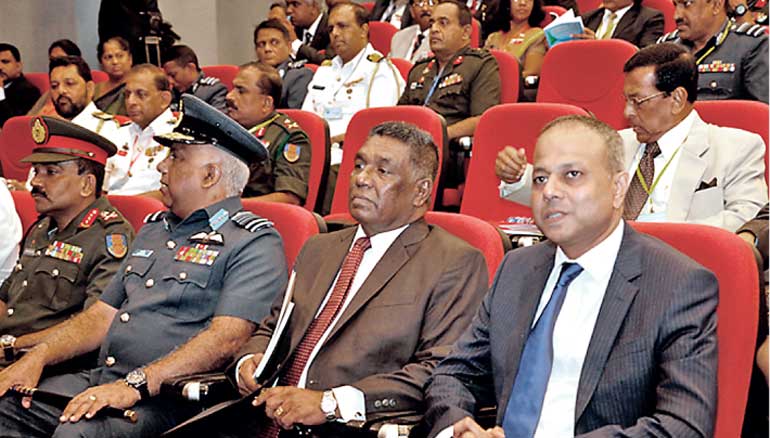Tuesday Feb 17, 2026
Tuesday Feb 17, 2026
Tuesday, 13 September 2016 00:01 - - {{hitsCtrl.values.hits}}
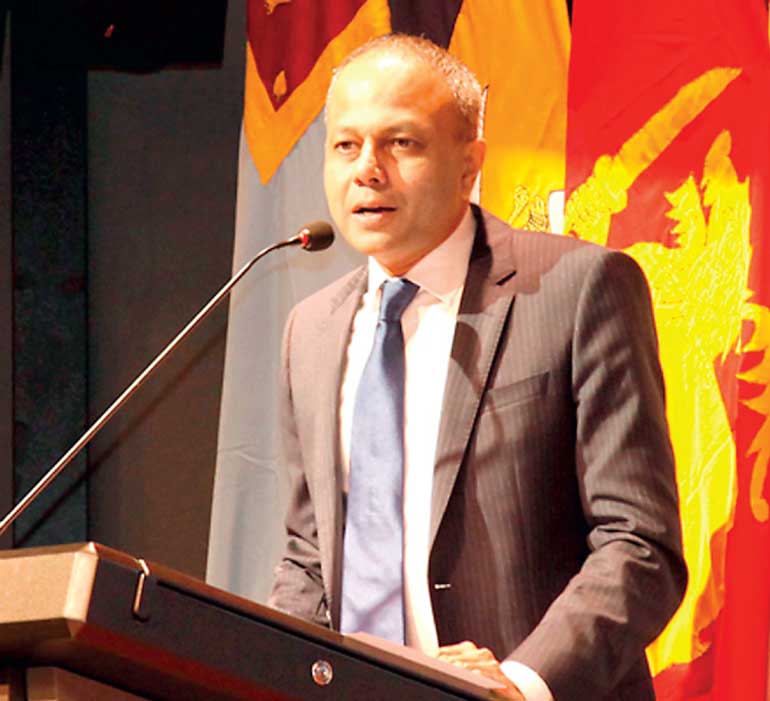
Member of Parliament Ashu Marasingha, Secretary Defence, Attorney General, Chancellor of Kotelawala Defence University, Vice Chancellor of Kotelawala Defence University, Your Excellencies, Commanders of the Sri Lanka Army, Navy and Air Force, Secretaries to Ministries, distinguished invitees from international organisations, scholars, ladies and gentlemen, and friends, I am indeed honoured and privileged to be invited to make the keynote address at this ninth international research conference organised by General Sir John Kotelawala Defence University on the theme ‘Professional Integration for a Secure Nation,’ and I thank the Vice Chancellor and the conference organisers for inviting me to initiate the deliberations of this important conference.
At the outset, I must convey my congratulations to KDU for the achievements it has made in the recent past and thank the authorities and the staff of KDU for their contribution to elevate the level of our armed forces by gradually enhancing the intellectual capacity of our officers over the last 35 years or so. Indeed, as a tertiary educational institution in Sri Lanka that gives a very high priority for high quality research and is systematically expanding to accommodate additional disciplines, KDU affirms and enhances the true purpose and meaning of an academy. In short, it sets an example to the entire tertiary education system in the country.
The commitment to research is amply demonstrated by the fact that KDU has hosted eight international research conferences before this. Although primarily founded to train undergraduates in fields related to the broad subject of defence, KDU has evolved in a manner that clearly indicates an acknowledgement of the complexities related to issues of security in a fast changing environment of technological advancement along with the emergence of forces that not only has access to these but have no qualms about abusing the knowledge to produce horrific outcomes. Moreover, KDU has explicitly acknowledged that security in its broad sense is not limited to threats of a military kind. It is apt, then, that the theme of this conference recognises the need for integrated approaches in issues pertaining to national security.
Ladies and gentlemen, national security is a concern of very high priority of every country, and it has become vitally important in the modern context of complex geopolitical, economic and social realities in the world. We live, after all, in a world where threats are both internal and external. The enemy, so to speak, operates with scant regard for national boundaries.
We live in an era of transnational terrorism where the enemy operates on multiple fronts using multiple pathways. Infiltration is no longer about the enemy breaking through defence lines or territorial boundaries surreptitiously. It is also about breaking into repositories of sensitive information. It is about codes within codes, the manipulation of minds through multiple mechanisms, and the sophisticated use of misinformation.
The preying on vulnerabilities is far more complex than it used to be even a mere decade ago. All the more reason to empower readiness with integrated approaches. Needless to say ladies and gentlemen in this effort, serious, uncompromising and dedicated research is a non-negotiable prerequisite.
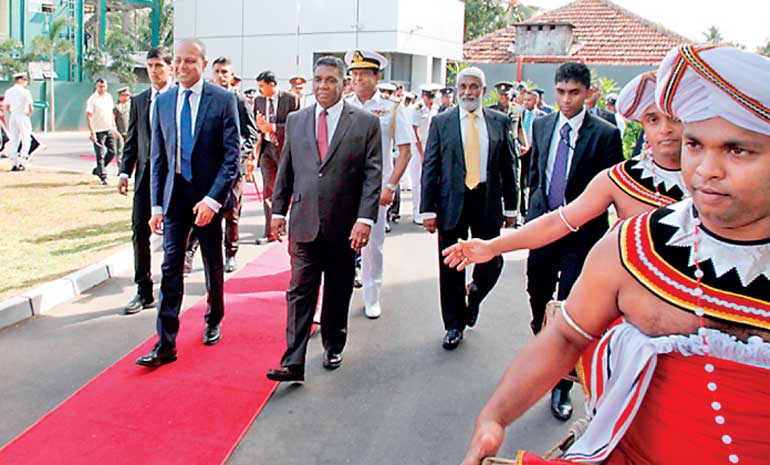
We have learnt through the harsh experience of two bloody insurrections and a three-decade-long war that national security is not a matter than can be handled by the security forces of a country alone. Whether we like it or not, it is a matter where every citizen has a role to play, however small it may be. An alert, informed, educated and disciplined citizenry is an invaluable auxiliary force to the formal institutions dedicated to national security. You would no doubt discuss during these sessions the important roles played by non-military sections of the population in securing our nation from the threat of terrorism.
True professionalism in whatever field, contributes immensely. Knowledge-produced through research in whatever field of study is useful one way or another. The integration of professionalism, then, produces a bulwark that can make a huge difference in strengthening the theatre of security in a country. The conference will no doubt provide opportunity for stimulating discussion on such issues and for a sharing of knowledge that help the participants in their search for answers to complex problems.
Ladies and gentlemen, when I referred to Sri Lanka’s experiences on the subject of national security, I spoke in the past tense. We have lived through harsh times where death, dismemberment, destruction and displacement were part of the everyday stories of individual as well as collective tragedy.
Today, in our present, we have recognised the importance of addressing anomalies which can be exploited to the point of creating conditions for conflict that lends a hand to extremisms. If our approach to ending a long-drawn conflict draw from multiple disciples and their effective integration, then the post-conflict struggle for reconciliation and sustainable peace must build on those strengths. We have recognised this and our Government is sparing no pains to mobilise the very same resources for this purpose.
Indeed, our policies are based on the overarching theme of integration and unification, that is the integration of all irrespective of ethnic, religious, caste, class or any other differences as we strive to achieve and strengthen peace, harmony and coexistence, which are the signs of a secure nation, a nation of strength that can withstand any internal or external threats to its national security. It is in this context that I believe that the deliberations on the subject of integrity ought to consider the interrelated nature of democracy and development with the more traditional, that is to say military, aspects of national security.
I am sure that this distinguished audience is well aware of the fact that there are threats of many kinds. Poverty, unequal distribution of resources, division along petty political lines, social fragmentation, inadequate employment, corruption and malpractices, the proliferation of drugs among the youth, inadequate healthcare and cyber-crime are common to most if not all countries. They all constitute threats to security of one kind or another.
In such a context, ladies and gentlemen, we must realise that neither the government nor the security forces can single-handedly confront the multiplicity of threats. They need the support of all professionals to work together to ensure a secure nation for the younger generations and indeed generations yet to come. So, whether you are an academic, an engineer, a doctor, a lawyer, an accountant, a manager, a politician or a member of any other profession, you need to clearly identify the role you play and perform it with the utmost commitment to make the nation a secure one from diverse threats that may be local or international.
Everyone, then, has a part to play, a civic responsibility if you will, in strengthening democracy and a development drive which seeks to move towards resolving societal anomalies that threaten peace, stability and indeed democracy itself.
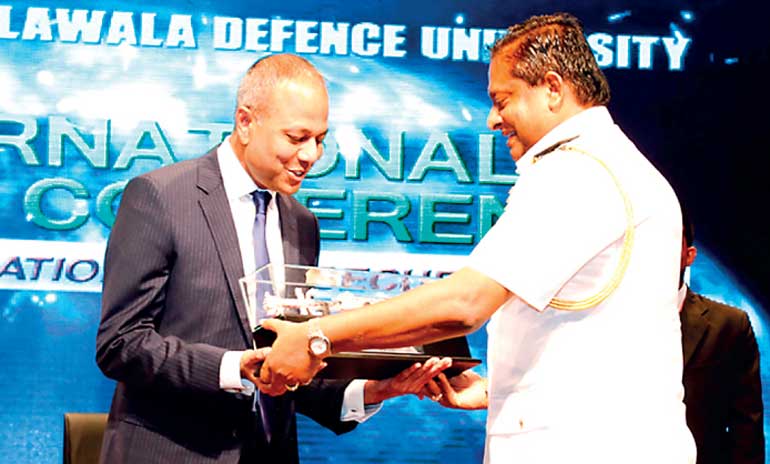
Sri Lanka has learnt that insecurities generated by poor representation, limiting of freedom, mal-development, societal anomalies, the limiting of opportunities and the non-satisfaction of reasonable aspirations have often provided the conditions for fissures that produce national security nightmares. I am encouraged therefore by the fact that KDU has embraced spheres that are not traditionally associated with national security.
We need, as all nations need, young men and women who are well-versed in all the subjects related to development even as we need, as always nations do, young men and women who are empowered with the knowledge necessary to handle those security threats that are of a military nature. We need simultaneously to correct systemic flaws that inhibit freedom, and to strengthen existing structures that make for a healthy democracy, including, where necessary, amendment of relevant legislation and creating institutional arrangements that safeguard these rights.
I cannot emphasise enough, therefore, that the present Government of Sri Lanka, under the leadership of President Maithripala Sirisena and Prime Minister Ranil Wickremesinghe, is totally committed to taking every possible step to maintain the status of our country as a secure nation in the broad sense I’ve outlined above.
Our approach has been and will be holistic. We stick to the fundamental principles of good governance. We are determined to put in place the checks and balances that insure our people and our nation against system-abuse. We believe that this is a necessary precondition not just for a healthy democracy but to ensure that the best minds in the relevant fields are mobilised to serve the national interest.
In the relatively short period of time since President Sirisena was elected and a new Government ushered in, we have made considerable progress against the stiff odds. The foundation for democratic change has been laid and we are determined to build a strong edifice that will stand the test of time.
Ladies and gentlemen, the best democracy, if it is poor, will not make a happy citizenry. An unhappy, disillusioned and frustrated citizenry is not the best news for either democracy or national security.
What democracy does is to create the space necessary for the airing of grievances. However, if such aired grievances are not addressed or due to reasons of economic stress cannot be addressed, democracy itself is rendered vulnerable. This is why development is priority. We must understand that vulnerabilities are preyed on by forces bent on destruction and thrive in situations of anarchy.
Ladies and gentlemen, let it not be said that this Government in setting itself an agenda that focuses on development and the democratic reforms necessary to ensure accountability, transparency and the rule of law, is neglecting what has traditionally been considered the preserve of the security forces.
We are acutely aware, as I mentioned at the beginning, of the possibility of national security being breached, less on account of mal-development, constitutional error or flaw, and non-addressing of grievances, but the threat of incorrigible players that can and will exploit the slightest weakness in a security system.
We do recognise the palpable need for a demilitarisation the fulfilling of which grants relief to a war-weary nation desperately in need of pushing aside the signs and symbols of conflict. We have been mandated to do this. On the other hand, let it not be, that this amounts to a dropping of the guard. No nation, however small, can afford to do this.
A nation such as ours which has had the bitter experience of suffering setbacks on all fronts due to unpreparedness will not be caught napping. Demilitarisation, ladies and gentlemen, does not mean a suspension of a military apparatus. The withdrawal of non-strategic wartime camps and the removal of checkpoints are necessary measures in a country that moves from a conflict mindset to one which needs to get used to the ideas of peace, reconciliation and co-existence.
However, we have not and will not compromise the intelligence element of national security measures. Intelligence, you would agree, is a key component of any national security apparatus. We recognise this. Few predicted the upheavals of 1971 and 1988-89. Few thought that unrest among young people in certain parts of the country would snowball into a full blown war that set the country back by several decades, not just hampering and indeed bringing to a halt national development, but causing large scale destruction to state resources and human resources.
We cannot predict what terrors the future holds. We can do our best to ensure that conditions for such eruptions are not created, but human frailty there will always be, and always there will be extremist elements that can destroy the best laid plans. There is no substitute for readiness on these matters.
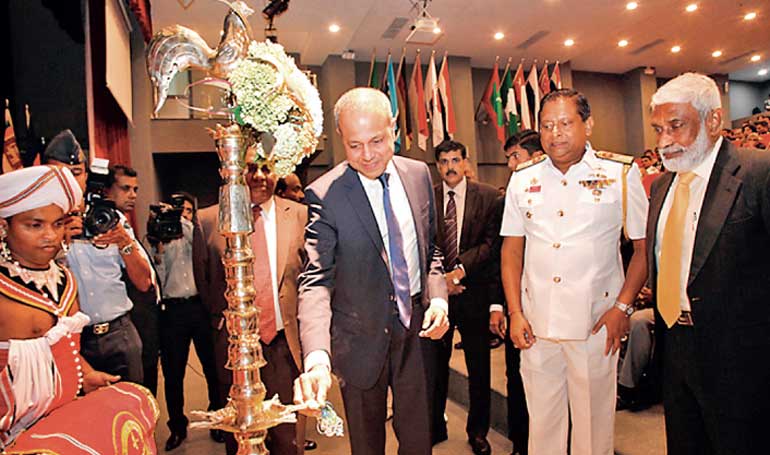
In all this, as I said before, the efforts of a well-meaning government will come to naught without the wholehearted support of the citizenry and especially the professionals. The role of the Government is to create conditions which encourage the citizens and professionals to recognise this and clear pathways for everyone to engage positively and in the spirit of civic responsibility.
The people of Sri Lanka can look back and feel proud of their achievements. Everyone played a part. However, all of us must understand that civic duty is not something one is called upon to demonstrate in a moment of crisis but that it is an everyday affair. We all have to do our bit because we all benefit from the commitment and efforts of those who do so. Whether we emerge as a more wholesome nation that upholds the principles of democracy, celebrates the rule of law and enjoys the full flowering of respect and civility depends on this commitment. I should say, ‘this commitment to an integrated effort to ensure the security of the nation on all counts’.
Ladies and gentlemen, I do not want to delve into more theoretical aspects on the conference theme, which I am sure will be dealt with by the eminent scholars present here today under various sub themes under which the faculties of KDU will be deliberating. The research presentations that will be done during the plenary and technical sessions in this conference will illuminate on theoretical and practical knowledge developed and solutions to problems and fill the gaps in the knowledge bases under various disciplines. They will no doubt open up new avenues of inquiry that would be beneficial not only for us in Sri Lanka but also for the people of the rest of the world.
Let me end this short comment by congratulating the Vice Chancellor and the staff of KDU for organising a research conference of this nature on a theme that speaks to the challenges faced by a nation emerging from conflict and all its attending tragedies and importantly a nation that is finally recognising that democracy and development are non-negotiable components of all national security measures that governments and citizens have to contend with.
